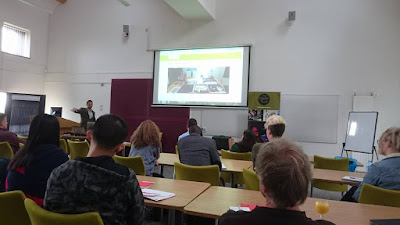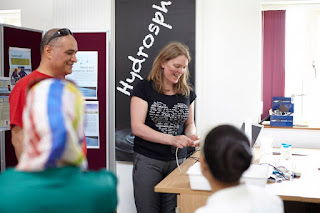 |
| Smoke plume across Stoke-on-Trent from burning plastics |
It is one week since I spotted the huge plume of smoke from the fire in Milton at Hanbury plastics recycling center. I was standing around five miles away when I took the image below. The sight of this cloud, that seemed to be quite still, was surreal. The cloud sat right across a heavily populated area and residents some miles downwind reported ash and dust falling. This site has been reported to be operating illegally with a stockpile of bales of plastic building up to dangerous levels. Stockpiling of waste with variable value on the market is not unusual, until the price of material rises. The trouble is that these sites are hazardous with a high fire risk. Fires in tyre dumps, scrapyards and waste facilities are particularly nasty producing toxic fumes with carcinogenic hydrocarbons, heavy metals, halogens and depending on the condition of the site, asbestos.
 |
| Food waste being processed for biogas production |
It would be easy to be critical of the industry but to be honest, most of our waste handling is done with care and compliance. Encouraging, as we have a lot of waste. Even better if we can use this waste where it is produced without the need to ship it abroad and turn it into new products or directly into energy (cue picture of food waste being processed for anaerobic digestion at Biffa). What is great about anaerobic digestion is that it breaks down waste food to produce useful gas and fertiliser to help grow more food. Its interesting to note that food waste would break down like this in landfill and the methane, a powerful greenhouse gas, could have been released into the atmosphere. Very impressive process but worth noting the plastic bags you see on the picture. These have to be filtered out and disposed of. Plastic bags, like these that are used to line our bins, stick around in the environment for between 20 and 1,000 years. A big price to pay so that you don't have to rinse your bin every now and again.
Plastics are awesome, don't get me wrong. They are clean, re-usable, lighweight and cheap to buy. They enable safer medical treatment, efficient, lighter transport and stronger, longer-lasting materials. I would argue the true cost of plastics is seen in the environment in the long-term storage, disposal and reprocessing and pollution of our environment. The trouble is that the impact of our waste is hidden from us. We put it in our bins and it just goes away...to plastic heaven maybe?
The fire at Hanbury is still burning a week later and it probably will be for some time. Chemicals are still pouring into the environment from the burning pile of milk bottles, food cartons, plastic bags, etc. The smoke acted as a catalyst to get people talking about waste and where it ends up. I worry that we still are not talking enough about reducing the waste we produce. It worries me that shops are stuffed with plastic goods and goods wrapped in plastic in massive volumes. We need a rethink. We are smarter than this.










